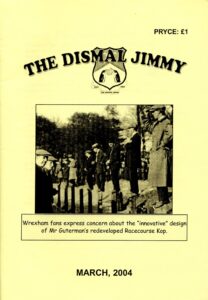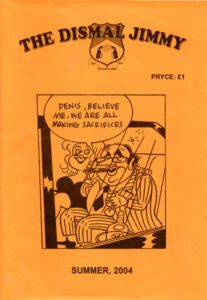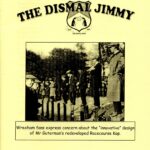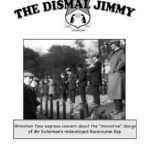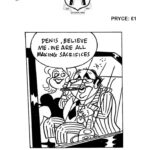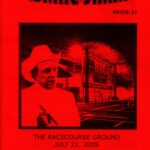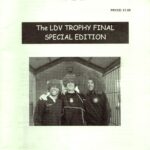Wrexham AFC - The Lean Years

Wrexham AFC Fan Protests
There still remained some high points, with Wrexham reaching the FA Cup quarter-finals in 1997 for only the third time in the club’s history, beating West Ham United on the way before losing 1-0 to Chesterfield. 1999 also brought some notable events, with the opening of the Pryce Griffiths stand on Mold Road, and the victory over (then) Premier League side Middlesbrough in the FA Cup Third round 2-1 on the Racecourse, with Paul Gascoigne, German international Christian Ziege and Brazilian star Juninho in the Middlesbrough side that day.

Mark Guterman
However, the dark clouds were gathering and the vultures circling as the Town fell on hard financial times. In March 2002, to a company called Memorvale Ltd, fronted by Mark Guterman, purchased 78% of Wrexham AFC from Pryce Griffiths. In June Mark Guterman became the Chairman of Wrexham AFC, with the statement “Judge me on the signings and on-the-field activity.”, as was later found, it was the off-field activity that he really should have been judged on. Guterman was felt by the Wrexham fan base to be a controversial new “owner” of the club, due to the somewhat tarnished reputation he had acquired through his previous activity in the football world. His tenure as Chairman of former club Chester City had ended with that club in administration following a ‘cash crisis’.
In fact, when Guterman took over the Chairmanship of the club, he was subject to an Individual Voluntary Arrangement that dated from November 2001. An individual voluntary arrangement (IVA) is a formal agreement between a debtor and his creditors as to how and when his debts will be paid. If this had been publicly known, it would have led to questions being raised as to how exactly he was funding the purchase of the club, and, also, according to the Articles of Association of Wrexham AFC Limited, Mr Guterman should not have acted as a director of Wrexham AFC, as the Articles of Association state, that any person subject to insolvency proceedings cannot continue to act as a director of the club. An IVA is in fact such a proceeding.
The Club’s Articles of Association also state that all club directors must hold at least 5 shares in their own name. However, Guterman did not own any shares in Wrexham AFC that were registered in his own name, in fact Pryce Griffiths actually sold his 78% shareholding in Wrexham AFC Ltd to Memorvale Ltd., not Guterman directly. Guterman was a director of Memorvale along with his former business associate Alex Hamilton and a woman called Teresa Hinde. Ms Hinde owned the only share in Memorvale according to Companies’ House records and Memorvale was a wholly owned subsidiary of Broadhill Properties Ltd. This is itself a company owned by a certain Alex Hamilton.
In spite of the background activities, 2003 saw new manager, Denis Smith, mastermind promotion straight back to the Second Division, after relegation in 2002. The now renamed ‘Red Dragons’ also won the FAW Premier Cup with a 6-1 win over Newport County at the Racecourse. But while the fans focus was on the on-field success, there were moves being made that would lead to years of troubles at the Club, and a threat to its very existence.

Alex Hamilton
Just 15 days after Guterman took over at the Racecourse, Wrexham AFC purchased the freehold of the Racecourse ground from Wolverhampton Dudley Breweries for the sum of £300,000 to pay off VAT bill from the Inland Revenue. But the ownership was immediately, and worryingly, transferred (but with no money going to the Club) to another company called Damens Ltd (a business owned by a certain Alex Hamilton). Hamilton later claimed that he was “approached by the club” with a proposal to surrender and re-grant the lease in return for the payment. The transaction was conducted on the Club’s side without Guterman holding a full board meeting to discuss the transaction or with the Club’s minority shareholders consulted on the matter. In effect, Guterman/Hamilton now had total control over the club’s lease through Memorvale Ltd and the freehold to the Racecourse (a site worth anything up to £10m depending on planning consent) through Damens Ltd., as well as holding the ownership of the football club.
The Club’s previous lease on the Racecourse Stadium had been negotiated by the previous chairman Pryce Griffiths with the brewery and at the time of its inception was thought to have secured the long-term future of Wrexham AFC. The club paid £750k to the brewery as a premium for the grant of this 125-year lease. The new lease had an ominous clause that allowed the Landlord (Damens) to evict the Club from the Racecourse with 12 months’ notice upon payment to the club of £1 million or one third of the developed value when exercising the break clause. The rent increased from £1, a peppercorn amount that had been in place for decades previously through the empathetic brewery owners of the ground, to a massive £30,000 per annum.
As in the transfer of the freehold, this matter was passed without a full board meeting being called. Guterman and the then club secretary David Rhodes produced minutes for a “meeting” that showed the absent directors as having tendered “apologies”. In reality the absent directors were unaware of the meeting because they had not been informed that there was in fact a meeting. And again, the Club’s minority shareholders were not consulted on this matter.
May 2004 saw fans showing ‘red cards’ to Guterman during a protest, aided by Brighton & Hove Albion supporters, at the last match of the 2003-4 season at the Racecourse. Guterman then resigned as Chairman for personal reasons amidst rumours club facing (engineered?) financial meltdown. This match also revealed the lack of understanding that some fans had of the situation behind the closed doors of the boardroom, with some of the protesters suffering abuse. Alex Hamilton then stepped in to become the new Club Chairman, amid fears that he planned to sell the ground for development even at the expense of the demise of the Club. This becomes transparently obvious when Hamilton told the Wrexham Leader: ‘If there are any further demonstrations on this club’s premises, I will not allow any more football to take place on this ground.”
Two weeks later Guterman left the club. His official statement claimed that he had resigned for family and personal reasons. However, in reality his one-time associate and club owner Alex Hamilton had dismissed him. Hamilton had become increasingly concerned at the financial situation at the Club and Guterman’s management of it. Later actions and revelations indicated that the supposed mismanagement of the Club’s finances was possibly preconceived to create an environment that would lead to the Club having to at the very least relocate, or possibly even fold.
When Guterman left the club in May 2004, shareholders were still waiting for the accounts to May 2003 to be published. They were eventually published in July 2004 and revealed that the Club’s debts had risen by over £500k during Guterman’s stewardship. This included £900k owed to the Inland Revenue. Guterman had failed to pay any income tax during the preceding 12 months and it was the Inland Revenue who eventually petitioned for a winding up order.
Throughout his time at Wrexham, Guterman had maintained to the public that he was the owner of the club, and that he was supporting it using his own money. In fact, the truth of the matter was rather different as Justice Mann heard in the Chancery Division of the High Court on September 6th 2004, in an action between Guterman and Hamilton and companies under Hamilton’s control. It appeared that they had now fallen out and their disagreements now formed the subject of wide-ranging litigation following Guterman’s decision to obtain a freezing order on the Racecourse preventing Hamilton from selling it without his permission, possibly fearing that Hamilton would not pay any monies promised to Guterman if their preconceived plan had succeeded, and the Racecourse redeveloped for other uses.
“He (Guterman) entered into a number of agreements with the first defendant (Hamilton) whereby the first defendant provided finance for certain projects in exchange for profit share. Joint ventures entered into under the agreements included the redevelopment of Wrexham Football Club”
On July 21st 2004 Damens Ltd (owner Alex Hamilton) exercised the break clause inserted in the new lease and served on Wrexham Football Club (owner Alex Hamilton) 12 months’ notice to quit the Racecourse. There is no other alternative home for the club and crucially after the 2-year tenure of Guterman and Hamilton there are no longer any assets left at the club with which to satisfy the creditors. On more than one occasion Hamilton has stated that he has no interest in football and his sole interest in Wrexham is to realise as much profit as he can from his initial investment.
In November 2004, Club directors, Dave Bennett and Dave Griffiths, opposed election of Alex Hamilton’s son and personal assistant as Club Directors, which enraged Hamilton to the degree that he resigned as Chairman in the heat of a boardroom battle. Hamilton then tried to call an emergency shareholder meeting to reinstall himself as Chairman, but failed as awareness of the plans had now become public knowledge. The ‘Two Daves’ have earned a debt of gratitude from all Wrexham fans, as without their resistance, the future of Wrexham AFC would have been in extreme doubt.
On October 21st 2004 the Inland Revenue served the club with a winding up order which was due be heard in the High Court on November 17th. The winding up petition was stayed as the club indicated its intention to apply for administration in an attempt to save the oldest football club in Wales from extinction. Inevitably the Club finally went into in to administration in December and Begbie-Traynor were appointed to run the club and to find a buyer. Against this background, and an obvious to anyone else but the Football League. that this situation had been deliberately engineered by the owners to kill off the Club, Wrexham FC become the first club to be penalised 10 points by the Football League for going into administration, under recently introduced League Rules., a blow from which the Club never recovered and those 10 points proved crucial at the end of the season as Wrexham were eventually relegated by just 8 points into League 2.
Over the next few months, several consortia tendered bids for the Club including Woking businessman Andy Smith, Middlesex businessman Paul Buttivant, and Neville Dickens and Geoff Moss from the local area. During this time, Hamilton appeared to be stalling negotiations on purpose, which would lead to the Clubs eviction by July if there was no buyer in place.
April 2005 brought some further news, with the Administrator’s announcing Neville Dickens interest in buying the club. In the Courts Mark Guterman was forced to make public all his and Alex Hamilton’s business dealings involving the club and the ground. Meanwhile, rumours of a bid to buy the Club by developers mobilised fans to mount a massively supported protest march from Llwyn Isaf in the centre of the town to the Racecourse to highlight the threat to the Clubs existence. Wrexham Supporters Trust backed Neville Dickens consortium’s bid, as they were not in a position at that time to fund a fans takeover, but at that point Hamilton angered fans by signing an exclusivity agreement with Surrey businessman, Andy Smith, who ran a dubious property development company, United Plot-owners Association (UPA), over the future of the club.
Even with all the background turmoil, the spirit of the Club continued to show through, with Wrexham winning The English Football League Trophy (LDV Vans Trophy) in front of 36,000 fans at The Millennium Stadium in Cardiff at the end of that season.
However, in October 2005, a landmark decision was made in The High Court who ruled that Alex Hamilton, had improperly acquired the freehold of The Racecourse in the name of his own limited company in a bid to make money from the destruction of the club and the sale and redevelopment of the ground, and so the Club remained in the hands of the Administrators until a deal was struck with a new consortium, Neville Dickens and Geoff Moss, who signed the deal with the Administrators and became owners of Wrexham Football Club and its assets, just five days before the club was due to be wound up. The new owners created a new company, Wrexham Football Club (2006) Ltd and transferred ownership of the club and stadium into a new holding company, called Wrexham Village Ltd.

Wrexham AFC 3 Boston 1
On the pitch, a series of defeats led to the dismissal of popular manager, Denis Smith with former player Brian Carey taking charge. Following an impressive late run of form which saw Wrexham win 4 out of their last 5 games, including defeating local rivals Shrewsbury in the last ever derby match at Gay Meadow. Wrexham’s league status was saved on the last day of the season with a vital 3–1 victory over Boston United at a full Racecourse which sent their opponents down and ensured that Wrexham would stay in the Football League.
Damage had been done however, and, after losing at Hereford, they finished bottom of the league in 2008, thereby ending the club’s 87-year membership of the Football League.
The Dismal Jimmy
A new Wrexham AFC fanzine ‘The Dismal Jimmy’, which aimed to inform supporters of the club the truth about what was really going on at the Racecourse in the face of a press that continued to ignore the scandals was set up in 2004.
The term Dismal Jimmy is actually a tribute to the Wrexham Leader sports reporter of the era, Les Chamberlain, who described the unsettled Wrexham fans as Dismal Jimmies. Dismal Jimmy ran for 19 issues from March 2004 to January 2017.
Click on the covers to read the first two editions.
Wrexham AFC 2 Southend 0 LDV Vans Trophy Final (Sunday, April 10, 2005)
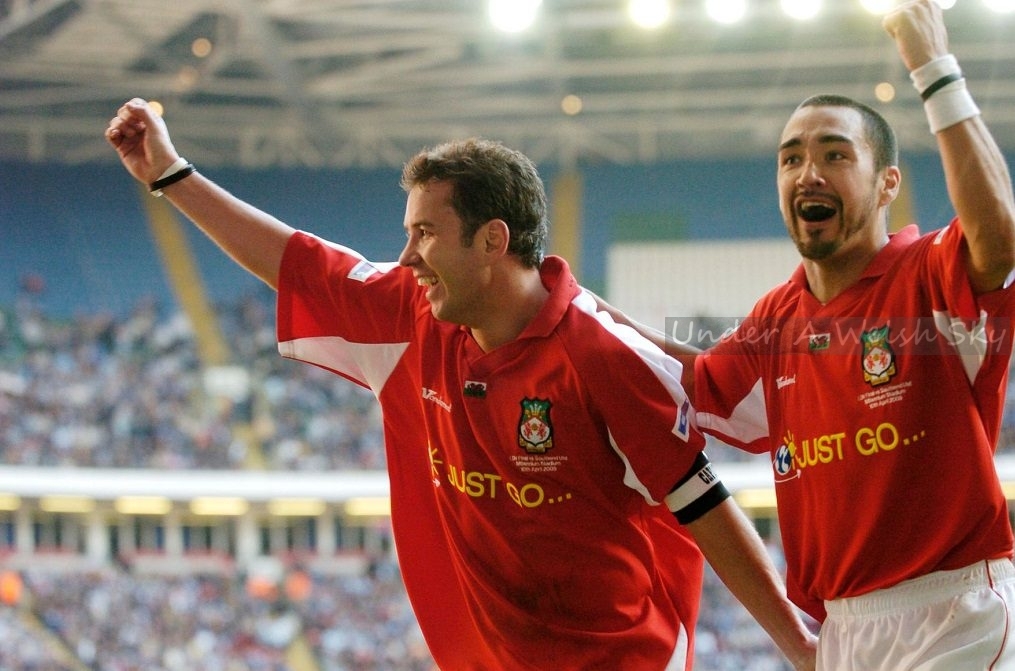
With a group of players in adversity as we were, it is one hell of an achievement to win something when you are in administration and everybody is trying to chop your legs from under you and you keep going.
Denis Smith
The 2005 Football League Trophy Final

Denis Smith with the 2005 LDV Trophy
The 2004–05 Football League Trophy, a competition for League One and Two sides, known as the LDV Vans Trophy for sponsorship reasons, was, amid the battle to beat the drop, and uncertainty surrounding the Club’s future, a welcome distraction and everyone connected with a club had a day out to remember at The Millennium Stadium on April 10, 2005, as Wrexham beat Southend United 2-0 to lift the trophy.
Over 20,000 Wrexham fans where at the Millennium Stadium to witness the club make history, a reward for their continued support in a turbulent time both on and off the field, and lift their first ever national cup. Wrexham had already been (unjustly felt to this day) docked 10-points for entering administration, slipping from a healthy league position and were now heading for relegation to League Two, while the administrators and fans were in the middle of a grim fight to save the club from extinction against Alex Hamilton and his plan to raze the Racecourse for development.
The match headed into extra time with the teams deadlocked at 0-0. But goals from Juan Ugarte and Darren Ferguson ensured that the Club, players and fans could celebrate long into the night in Cardiff.



